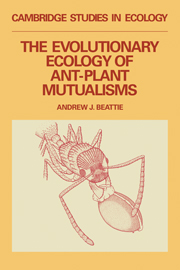Book contents
- Frontmatter
- Contents
- Preface
- 1 Introduction
- 2 Origins and early evolution of ant–plant mutualisms
- 3 Plant protection by direct interaction
- 4 Plant protection by indirect interaction
- 5 Myrmecotrophy
- 6 The dispersal of seeds and fruits by ants
- 7 Ant pollination
- 8 Food rewards for ant mutualists
- 9 Variation and evolution of ant–plant mutualisms
- References
- Index
9 - Variation and evolution of ant–plant mutualisms
Published online by Cambridge University Press: 07 May 2010
- Frontmatter
- Contents
- Preface
- 1 Introduction
- 2 Origins and early evolution of ant–plant mutualisms
- 3 Plant protection by direct interaction
- 4 Plant protection by indirect interaction
- 5 Myrmecotrophy
- 6 The dispersal of seeds and fruits by ants
- 7 Ant pollination
- 8 Food rewards for ant mutualists
- 9 Variation and evolution of ant–plant mutualisms
- References
- Index
Summary
The survey of ant–plant mutualisms in Chapters 3–7 presents a complicated picture. In Chapter 3 it was shown that careful studies of plant species that bear extrafloral nectaries have yielded contradictory results. Some show clear evidence of ant protection, others do not. In Chapter 5 the phenomenon of ant feeding of plants was confirmed in a couple of species, but the benefits conferred by ants on a great variety of others that harbor nests remained obscure. In Chapter 6 the discussion of ant dispersal showed that different authors can study the seed and seedling demography of the same elaiosome-bearing species and reach different conclusions as to the importance of ants at these life-history stages. The situation for ant pollination (Chapter 7) is also unclear. The data are scarce and claims of ant pollination, often based on anecdotal evidence, are generally inconclusive. Although it is possible that the differing conclusions reflect individual biases among authors, it seems more likely that they accurately reflect natural variation in function and effect. In this chapter the causes of this variation will be examined using ant protection and ant dispersal as examples.
The evolution of mutualisms is affected by demographic and life-history characteristics of the plant and ant populations. For the ants we know that particular foods are required at particular stages in colony development or reproduction. We also know that profound demographic changes such as the proliferation of worker castes or reproductives are likely to lead to increases and decreases in colony interest in plant rewards.
- Type
- Chapter
- Information
- The Evolutionary Ecology of Ant–Plant Mutualisms , pp. 128 - 145Publisher: Cambridge University PressPrint publication year: 1985



